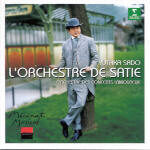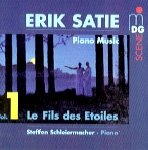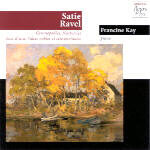

Forget the spaced out photo of Thibaudet on the cover, the meaningless title (“The Magic of Satie”), or the flipside tray card photo in which

Pianist Steffen Schleiermacher zeros in on the stark, austere character of Erik Satie’s choral-like, chord based pieces such as the Quatre Ogives, Première Pensée Rose

There’s more to Erik Satie than a collection of short piano works, cabaret songs, and eccentric anecdotes: he wrote orchestra pieces, ballets, and even an

If you’re an Erik Satie fan, you’ve probably come across his three preludes to Pèladan’s drama Le fils des étoiles–typically strange, stark, and oddly moving

Heard in close proximity, the Ravel and Satie works gathered here turn out to be more compatible bedfellows than you’d normally suspect. Perhaps Francine Kay’s

About three-fourths of this recital devoted to French piano music constitutes an auspicious debut for the young Canadian pianist Naida Cole. The opening selection, Fauré’s

For me, the real “Best of Satie” would include at least excerpts from the opera Socrate and the ballet Parade. But this is a nice

Eric Satie’s ballets depend on sheer outrageousness to make their optimal effect; as absolute music, there isn’t much going on here. The melodic invention isn’t
![]()
